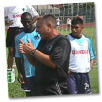Discipline – An Outdated Concept?
I spend a lot of time with friends who are coaches. Invariably the topic turns to today’s athletes, and to one question: “Are they different?
They certainly are different in many ways from the athletes of 1969, when I started coaching. But the biggest differences are not in the athletes themselves, but in the society we live in.
One of those differences has been a breakdown in discipline. Discipline is the foundation for excellence, and self-discipline is the highest form of discipline.
Of course, for youngsters to learn self-discipline they must have guidance: what is right, and what is not right? That guidance takes the form of rules.
Coaches today have become reluctant to set rules, because then they must enforce them. That could be uncomfortable. What if a parent challenges them? Will they receive backing from the administration, from the school board, the principal, the vice-principal, and the athletic director? That’s certainly a legitimate concern, when anything from an attack by a parent to the coach’s job to a lawsuit could be at stake.
My conversation with various coaches who have been coaching for more than twenty years indicates that such backing from the school system, or lack of it, is the basic problem.
Coaches believe in discipline just as they always have, but they do not have the backing they used to have. Younger coaches are reluctant to set rules and enforce discipline because they will not be popular and they know they will not be backed.
What is the answer?
Sport is not isolated from society; it is a microcosm of the society in which we live. So it is naïve to think that the problems that exist in society will not exist on our track teams.
For the young athlete to learn discipline demands guidance. We as coaches must provide that guidance. We must set the standards by fair rules that carefully lay out the behavioral expectations involved in being part of the team. These must be written. They must be clear so that there is no room for debate. Essentially as the coach you are providing a structure to begin to improve their abilities and their enjoyment of track and field.
I think many of today’s athletes crave the structure we can give them, even though it may not be part of their everyday life outside of sport. But they have to understand that it’s a two-way street – that they can’t just follow the rules they like, but sometimes they must obey rules they don’t like. That’s the price they have to pay for the structure the coach provides.
Discipline is a responsibility of coaching. If we do not enforce discipline then we are shirking our duty as coaches.
We must understand that we are not coaching a sport; we are coaching young men and women who are competing in a sport. We owe it to them to provide the most positive experience that we can. Through firm and fair discipline we can create a favorable learning environment that will allow them to reach their potential.
How can we do this? We can start by getting everyone on our side.
You and your coaching staff should decide on the behavior that you expect of your athletes and then set the rules that will define those behaviors. Review them with your athletic director and if need be, the principal. Get them to buy in and support you before any challenges are made.
It might be even better if you can get your athletic department to set rules that members of every team at your school must observe, to insure consistency from sport to sport.
To those general rules, you can add rules specific to your sport. And if you feel comfortable doing so, you might want to involve the senior athletes and the parents in the process. If they’re part of the process, it’s easier for them to buy in.
Once the rules are set, schedule a mandatory parents’ meeting to go over the rules and responsibilities for their youngsters to be on the team. This meeting should also educate the parents to practice procedures, nutrition guidelines, lettering policy and criteria for varsity selection. Take the opportunity to educate the parents about the sport.
Both the parent and the child must sign a statement that they will observe the rules. If they do not they will not be allowed to participate. Emphasize that to be an athlete is special. It is a privilege to participate, not a right. There should also be a pledge from the coaches as to the behavioral standards the athletes and parents can expect from the coach. The ultimate goal is to create an atmosphere of mutual respect.
Remember as coaches we have a responsibility to teach our athletes. Very few will compete past the high school level, but they all can have the great growing-up experiences of testing their limits and being part of a team. The beauty of track is that there is a spot for everyone.
Discipline will help insure a positive experience. It is not outdated, and it never will be.


0 Comments:
Post a Comment
<< Home